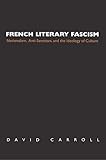French Literary Fascism : Nationalism, Anti-Semitism, and the Ideology of Culture / David Carroll.
Material type: TextPublisher: Princeton, NJ : Princeton University Press, [2022]Copyright date: ©1995Description: 1 online resource (309 p.)Content type:
TextPublisher: Princeton, NJ : Princeton University Press, [2022]Copyright date: ©1995Description: 1 online resource (309 p.)Content type: - 9780691223032
- Antisemitism in literature
- Antisemitism -- France -- History -- 20th century
- Fascism and literature -- France -- History -- 20th century
- French literature -- 20th century -- History and criticism
- Nationalism and literature -- France -- History -- 20th century
- LITERARY CRITICISM / European / French
- Action Française (the movement)
- Anderson, Benedict
- Apollonian
- Blanchot, Maurice
- Butler, Judith
- Corneille, Pierre
- Drumont, Edouard
- Etiemble
- Finkielkraut, Alain
- French Revolution
- Freud, Sigmund
- Godard, André
- Hamacher, Werner
- Heidegger, Martin
- Hollier, Denis
- Isorni, Jacques
- Italian fascism
- Jaurès, Jean
- Kafka, Franz
- Krieger, Murray
- Lautréamont
- Lévy, Bernard-Henri
- Mounier, Emmanuel
- Muray, Philippe
- Napoleon
- Nazism
- Pauvert, Jean-Jacques
- Plato
- Steiner, George
- aestheticizing of politics
- apocalyptic political vision
- barbarian
- decadence
- decadent art
- deracination
- force
- gender
- historicism
- humanism
- imagined community
- irrationalism
- masochism
- mysticism
- national identity
- nihilism
- organicism
- pleasure principle
- race
- republicanism
- revisionism
- socialism
- surrealism
- 840.900912 23
- PQ307.F3
- PQ307.F3
- online - DeGruyter
| Item type | Current library | Call number | URL | Status | Notes | Barcode | |
|---|---|---|---|---|---|---|---|
 eBook
eBook
|
Biblioteca "Angelicum" Pont. Univ. S.Tommaso d'Aquino Nuvola online | online - DeGruyter (Browse shelf(Opens below)) | Online access | Not for loan (Accesso limitato) | Accesso per gli utenti autorizzati / Access for authorized users | (dgr)9780691223032 |
Browsing Biblioteca "Angelicum" Pont. Univ. S.Tommaso d'Aquino shelves, Shelving location: Nuvola online Close shelf browser (Hides shelf browser)

|

|

|

|

|

|

|
||
| online - DeGruyter Labor Demand / | online - DeGruyter Power, Trade, and War / | online - DeGruyter Moral Tradition and Individuality / | online - DeGruyter French Literary Fascism : Nationalism, Anti-Semitism, and the Ideology of Culture / | online - DeGruyter The Cinema of Federico Fellini / | online - DeGruyter Modi's India : Hindu Nationalism and the Rise of Ethnic Democracy / | online - DeGruyter Stoic Romanticism and the Ethics of Emotion / |
Frontmatter -- Contents -- Acknowledgments -- Introduction. Literature, Culture, Fascism -- PART ONE: THE FATHERS OF FRENCH LITERARY FASCISM -- One. The Use and Abuse of Culture: Maurice Barres and the Ideology of the Collective Subject -- Two. The Beautiful Community: The Fascist Legacy of Charles Péguy -- Three. The Nation as Artwork: Charles Maurras and the Classical Origins of French Literary Fascism -- PART TWO: LITERARY FASCISTS -- Four. Fascism as Aesthetic Experience: Robert Brasillach and the Politics of Literature -- Five. The Fascist Imagined Community: The Myths of Europe and Totalitarian Man in Drieu la Rochelle -- Six. Literary Fascism and the Problem of Gender: The Aesthetics of the Body in Drieu la Rochelle -- Seven. Literary Anti-Semitism: The Poetics of Race in Drumont and Celine -- Eight. The Art of Anti-Semitic Rage: Lucien Rebatet's Aesthetics of Violence -- Nine A Literary Fascism beyond Fascism: Thierry Maulnier and the Ideology of Culture -- Afterword. Literary Fascism and the Case of Paul de Man -- Notes to the Chapters -- Index
restricted access online access with authorization star
http://purl.org/coar/access_right/c_16ec
This is the first book to provide a sustained critical analysis of the literary-aesthetic dimension of French fascism--the peculiarly French form of what Walter Benjamin called the fascist "aestheticizing of politics." Focusing first on three important extremist nationalist writers at the turn of the century and then on five of the most visible fascist intellectuals in France in the 1930s, David Carroll shows how both traditional and modern concepts of art figure in the elaboration of fascist ideology--and in the presentation of fascism as an art of the political. Carroll is concerned with the internal relations of fascism and literature--how literary fascists conceived of politics as a technique for fashioning a unified people and transforming the disparate elements of society into an organic, totalized work of art. He explores the logic of such aestheticizing, as well as the assumptions about art, literature, and culture at the basis of both the aesthetics and politics of French literary fascists. His book reveals how not only classical humanism but also modern aesthetics that defend the autonomy and integrity of literature became models for xenophobic forms of nationalism and extreme "cultural" forms of anti-Semitism. A cogent analysis of the ideological function of literature and culture in fascism, this work helps us see the ramifications of thinking of literature or art as the truth or essence of politics.
Mode of access: Internet via World Wide Web.
In English.
Description based on online resource; title from PDF title page (publisher's Web site, viewed 29. Jun 2022)


